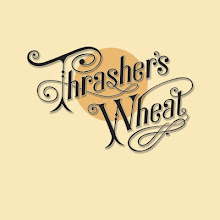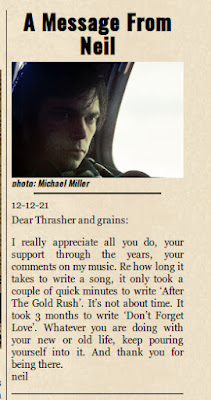There is nothing wrong with writing personal records.
Toast, Tonight's the Night, and Homegrown are all deeply personal, whilst also demonstrating great warmth and good-natured character. The artist here might be leader, a rebel, a passionate lover, or a freedom fighter, but it's quite clear he's not a vandal, arsonist, abuser, or terrorist.
Other great records see artists "playing the villain" with relish and glee, in a fictional (or allegorical) world they've constructed.
The opening songs of Talkin to the Trees seem to be neither of these. They are both personal and toxic. Malignant.
Likewise, there is a clear difference between "dark" and "harmful". Sleeps with Angels is a dark masterpiece, but packed with empathy and hope. The same is true of Greendale: full of grief, full of care.
The superb Green is Blue from Colorado is extremely dark and rooted in reality, but it is not the musical equivalent of a forest fire. It's more an invitation to pick up the fire extinguisher.
Once the songs seemingly become badly-sharpened instruments of destruction, then I think the artist has made an error of judgement.
It's also entirely out of character for Neil Young. The record strikes me as a tragedy, with the cyanide of the first two tracks seeping into our appreciation of the bittersweetness that follows. The latter songs are contextualised by what we've heard so far.
If these songs are as autobiographical as they appear, it seems he's decided hope is lost and has hit the nuclear button out of frustration and fear. He's sawn away at the last threads of a relationship.
This is something I will neither celebrate nor enjoy. A younger Neil Young, or perhaps an older one, would agree with me.
The momentary Neil we are hearing from right now, meanwhile, seems to be in crisis. Dark Mirage (which, of course, is a song with a perspective, and not the gospel truth) hints at depression, or multiple depressions, within the world it depicts. If so, the song itself is essentially destructive.
I can say with as much certainty as anybody: there are ways to overcome depression. But I don't think these songs are amongst those ways. They are more like fuel for the fire.
When an artist is in despair or in crisis, he must step away from the sharp tools of his trade until he's regained enough composure to use them with his previous care.
[ADDENDUM]
I think we have to be careful not to fall too comfortably into the viewpoint that the song presents us. (Not necessarily in Neil's case, but the parallel would be that auto-biographies can sometimes be self-flattering or one-sided).
With respect to Dan Swan [see below] and others, I'll admit I'm unconvinced about the whole "honest, authentic, real, brave" thing. A surgeon who wakes up in a bad mood and starts slashing away with the scalpel might be all of these things. He's also a bad surgeon. And he needs to put down the blade.
I don't think Neil will ever regret sharing the original Amber Jean song with the world. I'm not sure the same will be true of these new ones. To use his songwriting skill to dispatch his family as pawns in a chess game leads me to conclude he's made an error of judgement. Assuming my reading of this is correct, then presumably people close to him have made the same observation.
The flipside is that choosing to publish the arguably cruel songs here (at absolute best, a case of fighting fire with fire) is a wholly out-of-character aberration, both within the album and his decades-long career.
Of course, that doesn't make the traces of cyanide any easier to swallow.
Scotsman.
Many thanks Scotsman for sharing your thoughts on this vital subject in these times. Your contributions to the community are valued and appreciated.












































 Human Highway
Human Highway

















 Concert Review of the Moment
Concert Review of the Moment





 This Land is My Land
This Land is My Land

 FREEDOM In A New Year
FREEDOM In A New Year









 *Thanks Neil!*
*Thanks Neil!*




![[EFC Blue Ribbon - Free Speech Online]](http://www.thrasherswheat.org/gifs/free-speech.gif)











 The Unbearable Lightness of Being Neil Young
The Unbearable Lightness of Being Neil Young Pardon My Heart
Pardon My Heart



 "We're The Ones
"We're The Ones  Thanks for Supporting Thrasher's Wheat!
Thanks for Supporting Thrasher's Wheat!




 This blog
This blog 
 (... he didn't kill himself either...)
#AaronDidntKillHimself
(... he didn't kill himself either...)
#AaronDidntKillHimself









































































 Neil Young's Moon Songs
Neil Young's Moon Songs




 Civic Duty Is Not Terrorism
Civic Duty Is Not Terrorism Orwell (and Grandpa) Was Right
Orwell (and Grandpa) Was Right


 What's So Funny About
What's So Funny About 


